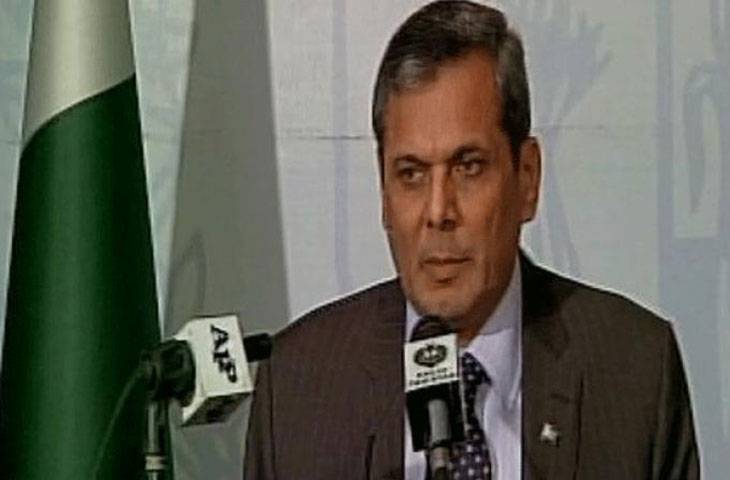ISLAMABAD - Pakistan yesterday sent another letter to India inviting foreign secretary S Jaishankar to visit Islamabad this month and hold talks over the Kashmir issue.
The development came days after India rejected Pakistan’s earlier offer for talks on the decades-old dispute and insisted the dialogue should only be restricted to terrorism and security matters.
Foreign Office Spokesman Nafees Zakaria said Indian High Commissioner Gautam Bambawale was handed a letter by Foreign Secretary Aizaz Ahmed Chaudhry – a reply to his Indian counterpart’s correspondence where New Delhi out-rightly rejected the proposal to discuss the Kashmir violence.
“The Indian envoy was summoned by the Foreign Secretary and a reply to the letter of the Indian Foreign Secretary was handed over to him. The letter invites the Indian Foreign Secretary to visit Islamabad by the end of this month to discuss the Jammu and Kashmir dispute,” Zakaria said.
He said Pakistan called for putting an immediate end to the human rights violations against the innocent people of Indian occupied Jammu and Kashmir.
“Pakistan also called for providing medical facilities to the injured... (and) permission for doctors and paramedics to travel (to IHK),” he added.
Earlier, Jaishankar had conditionally accepted Aizaz Chaudhry's invitation for talks making it clear that the agenda should concern only issues related to terrorism. In his letter, the Indian foreign secretary said the talks should focus on five aspects of terrorism.
“In a letter dated 16 August, Foreign Secretary has first of all underlined that Pakistan's self-serving allegations made in their communication are rejected in their entirety by the government of India,” Indian External Affairs Ministry spokesperson Vikas Swarup said. “Pakistan has no locus standi in respect of Jammu and Kashmir, which is an integral part of our nation,” he added.
According to Swarup, Jaishankar in his letter “conveyed that he accepts his counterpart's invitation to visit Islamabad” but made it clear that the discussions should focus first on the more pressing aspects of the Jammu and Kashmir situation.
The letter stated that Islamabad should end ‘various activities’ which harm India's interests including “cessation of cross-border terrorism.”
More than 70 people have been killed in Indian-held Kashmir Valley in clashes between protesters and security forces in the wake of the killing of a prominent Kashmiri freedom fighter Burhan Wani, in a military operation on July 8.
Relations between the two neighbours have nosedived over the Kashmir unrest, with India opposing Pakistan's moral and diplomatic backing of the protestors.
Pakistan has taken up the issue at the international level seeking support to stop the killings in Kashmir and make progress to resolve the issue peacefully.
Reacting to it, Indian Prime Minister Narendra Modi blamed Pakistan of committing ‘atrocities’ in Balochistan and elsewhere in the country.
Pakistan has been accusing India of fanning terrorism and turmoil in the south-western province.
In his speech to mark India’s Independence Day on Monday, Modi claimed that people in Balochistan and Gilgit have thanked him for his stating that their human rights have been violated.
Tariq Fatemi, Special Assistant to PM on Foreign Affairs, said the other day that Modi had “crossed a red line” by opining on Pakistan's internal issues that further strained relations between the two countries.
The Indian prime minister’s comments “could set back relations in a far more serious manner than anything that’s gone before,” he said in an interview with The Wall Street Journal.
Fatemi said that the Indian leader’s speech shows that Delhi is “in contact with militant elements” in Balochistan.
On Wednesday, the United Nations top human rights official called on India and Pakistan to allow UN observers access to both sides of Kashmir, “given grave concerns about recent allegations of serious human rights violations”.
The newspaper said there was no immediate response from New Delhi or Islamabad to the UN request.
More than 47 people have died and thousands more been injured in recent weeks in clashes between Indian security forces and protesters in Indian Occupied Kashmir. Indian has been making vain attempts to accuse Pakistan of fomenting trouble in Held Kashmir.
In the interview with WSJ, Fatemi said that Kashmir is an international dispute, whereas Balochistan is internal.
“We have never ever raised an issue in India which can be termed a domestic element of Indian politics,” he said.
“This adds a new twist which is far beyond the usual exchange of allegations and mutual recriminations."
The newspaper said that Indian officials weren't reachable on Wednesday night to respond to Fatemi’s comments.
Prime Minister Nawaz Sharif has repeatedly said he wants to normalise relations with India.
Fatemi said that the combination of Nawaz Sharif in Pakistan and a strong nationalist leader in India had “created an opportunity that we rapidly appear to be losing” for a political settlement between the countries. He said the speech shows that Delhi is “in contact with militant elements” in Balochistan.
In the interview, Fatemi said that Kashmir is an international dispute, whereas Balochistan is internal. “We have never ever raised an issue in India which can be termed a domestic element of Indian politics,” he said.
“This adds a new twist which is far beyond the usual exchange of allegations and mutual recriminations."
On Wednesday, the United Nations top human rights official called on India and Pakistan to allow UN observers access to both sides of Kashmir, “given grave concerns about recent allegations of serious human rights violations”.






